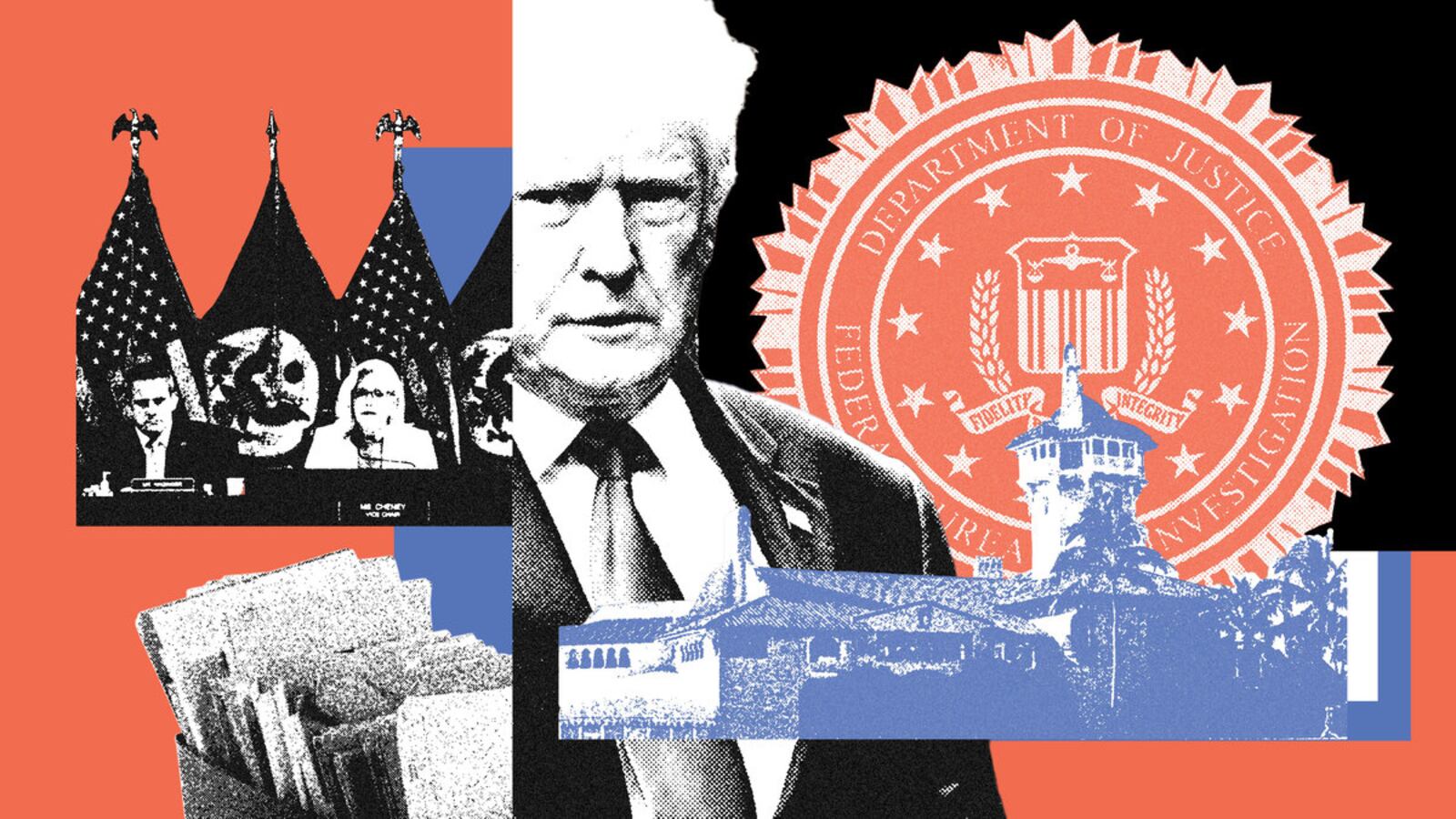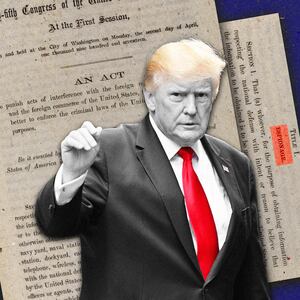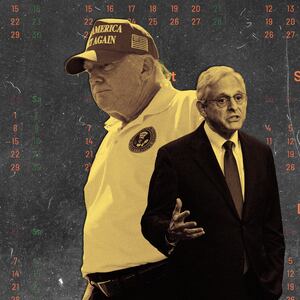America is grappling with an unprecedented choice: Should we, or should we not, indict an ex-president?
The Jan. 6 Committee has shown a ton of evidence that former President Donald Trump and various accomplices committed conspiracy to defraud the United States when he tried to stay in power after losing re-election. The FBI search of Mar-a-Lago—and Trump’s many shifting, contradictory excuses—indicate he likely committed felonies regarding the removal and concealment of national defense material, and obstruction of justice.
The legal answer, the one from rule of law, is straightforward. Prosecutors have ample evidence of serious criminal activity. The government has a legitimate interest in deterring a repeat of these crimes (especially the coup-related ones). No one is above the law, not even the person who was once the most powerful in the world.
But the political answer is more complicated.
Whatever the Department of Justice (DOJ) decides, it will set precedent, provoke public reactions, and shape history.
While the MAGA right will defend Trump no matter the evidence, some centrist voices who acknowledge Trump’s wrongdoing still oppose indictment to preserve “domestic tranquility.” Even if well-intentioned and entirely by-the-book, they argue, a Democratic administration bringing charges against the most recent Republican president (one likely to run again), would be counterproductive, inflaming an already tense situation.
I’ve argued that this relies too much on guessing highly uncertain political outcomes. If prosecuting Trump would set a dangerous precedent, so would letting his crimes slide. We can’t know what will happen, so we should follow the law and let the chips fall where they may.
But even if we say U.S. law enforcement should prioritize political impact, the “domestic tranquility” argument fails on its own terms.
Public Legitimacy
Rule of law, Damon Linker astutely points out, is not an automatic process. It’s “a set of complex institutional procedures and behavioral norms around matters of law enforcement,” one that requires public legitimacy. If following the letter of the law undermines Americans’ faith in public institutions, it would damage the rule of law more than uphold it.
If Trump is indicted, Republican leaders would denounce it, issuing “inflammatory statements,” Linker warns in The New York Times. They’d call the FBI and DOJ the “deep state,” and claim prosecution is “motivated by rank partisanship and a drive to self-aggrandizement.” Charging Trump, he argues, would end up “convincing most Republican voters that appeals to the rule of law are invariably a sham.”
But how many? And how much more convinced?
Republican politicians and media have been attacking public confidence in institutions for years, and will continue doing so whether or not Trump faces charges. To grant this reaction a veto over law enforcement, there ought to be strong evidence that prosecution would damage American institutions’ overall public legitimacy. And there isn’t.
On the FBI search of Mar-a-Lago, a Politico/Morning Consult poll found that 49 percent of American voters believe it was due to evidence of a crime, compared to 39 percent who say it “was conducted mostly to damage Trump’s political career.”

Police outside of Mar-a-Lago in West Palm Beach, Florida, on Tuesday Aug. 9, 2022, the day after the FBI searched Donald Trump's estate.
Joe Cavaretta/South Florida Sun Sentinel via Getty ImagesA majority of Democrats and an 11-point plurality of independents say the search was legitimate. By contrast, 69 percent of Republicans think it was politically motivated, while just 16 percent say it was related to evidence of a crime. But there’s no reason to think that the 16 percent will change their mind if it’s prosecuted, nor that the 69 percent will respect the rule of law more if it’s not. Maybe indictment would push the 15 percent who answered “don’t know/no opinion” to turn against law enforcement, but it could easily be the opposite. Or no net change.
A 2022 Gallup study found confidence in major U.S. institutions, including the criminal justice system, at the lowest point since its survey began in 1979. The reasons go far beyond scrutiny of Donald Trump. One reason is rich and powerful people getting away with crimes, while regular people land in jail. Making Trump immune to prosecution would likely reduce Americans’ confidence in rule of law more than indicting him would.
In The Washington Post, Jason Willick goes further, arguing that President Joe Biden should pardon Trump to “partially preempt” the claim that “Democrats want to suppress and criminalize their opposition.”
But there’s little reason to think pardoning Trump would restore Republicans’ confidence in rule of law. If large parts of the right already believe that federal law enforcement is hopelessly biased, and a big reason for this is seeing Trump as a victim, that belief isn’t likely to change. Not least because it’s based on lies.
For example, Russia conducted a big anti-American intelligence operation in 2016 aimed at helping Trump defeat Hillary Clinton. Members of the Trump campaign, such as campaign chair Paul Manafort, were “wittingly or unwittingly” involved. The FBI counterintelligence investigation began in July 2016, over a month before the FBI received the “Steele Dossier,” and a 2018 Inspector General investigation found the Russia probe had legitimate predicates and no evidence of political bias.
That certainly doesn’t mean the FBI handled it perfectly or that every media speculation was right. But if anyone believes the whole thing was a “hoax” and Donald Trump a persecuted victim—or that the Jan. 6 assault on the Capitol was nothing more than a “peaceful protest”—they’re already gone, and putting Trump above the law won’t bring them back.
If anything, it could make it worse. When Trump avoids consequences for apparent wrongdoing, his apologists use it as a defense. After all, if he actually did these crimes, if they weren’t just making it up, why didn’t they charge him?
If the DOJ indicts Trump, some Americans who already think rule of law is a sham will become more convinced, but I doubt there would be many of those who—until now—had kept their faith, but would change their mind over a Trump indictment.
Beat Him At the Ballot Box
The argument against indictment is partially about electoral politics. “It’s imperative we set aside the Plan A of prosecuting Mr. Trump,” Linker argues, and go with Plan B, “allowing the political process to run its course.” Under this logic, the only way to address the problem of Trump’s criminality is to defeat him in an election (again).
The broader question of America’s political future, including the challenge to liberal democracy posed by Trumpism, will be primarily decided by elections. But that’s a terrible argument against enforcing the law— because it’s not mutually exclusive.
Prosecutors can indict, and Trump can run for president. Under the law, he’s presumed innocent unless convicted in court. Only some of the potential charges could end up barring him from holding public office, and the likelihood that these cases are fully resolved before November 2024 are virtually nil. Whether charged or not, he can run, Republicans can nominate him, and Americans can vote for him.
The electoral argument against holding Trump legally accountable boils down to a prediction that indictment will boost his chances in 2024. I think it’s wrong to base law enforcement decisions on political guesses, but if you think they should take precedence, prosecution is more likely to hurt Trump’s chances than help.
“As we’ve seen in the aftermath of the Mar-a-Lago search,” Mona Charen writes in The Bulwark, “giving Trump a colorable case for ‘persecution’ by the Democrats is a huge gift.”
Is it? Who is it helping him with?
Remember which voters are most likely to decide elections. Not committed Trumpists, who may get angrier, but can vote only once. Nor other partisan Republicans, who might say they’d prefer a different nominee, but will turn out to vote GOP regardless. We’re talking about independents, swing voters, and occasional voters who tend not to follow politics closely.
These voters, on balance, think being under indictment is bad, not good. It signals to the general public that the alleged criminal really did do something wrong—that it wasn’t just political bluster, and the feds actually have a case. If a fraction of the 16 percent of Republicans who think the Mar-a-Lago search was motivated by evidence of a crime feel validated by a prosecution and switch to anti-Trump, that could swing elections.
One person who apparently believes this is Donald Trump. He made the impression of criminality central to his 2016 campaign against “Crooked Hillary.” In office, he abused power trying to extort Ukrainian President Volodymyr Zelensky into manufacturing an investigation of Joe Biden and his son Hunter.
As Trump understands, many Americans, especially occasional and swing voters, perceive “in legal trouble” as more serious than “denounced by political opponents.” Under indictment is not a good look to most who aren't already on board.
If we must put it terms of electoral politics, the DOJ charging Trump would likely inflame the base, and garner creative excuses from anti-anti-Trump pundits, but reduce his appeal to independents and swing voters. Any boost in Republican mobilization would likely be matched or exceeded on the Democratic side—as seen in record 2020 turnout. By contrast, putting Trump above the law would still motivate Republicans, maybe even more than indictment would, while deflating the Democrats’ base.
That leaves the Republican primary. As Josh Barro argues, it’s absurd for Republicans who’d like their party to get a new standard-bearer to demand that non-Republicans solve their Trump problem for them. And it’s never been plausible either.
There’s no path for an anti-Trump Republican, as the ostracization of Rep. Liz Cheney shows. So that means Trump would have to gracefully retire from public life—no sign of that—or a pro-Trump candidate would have to beat him. But no one hoping for that has been able to explain how it could actually happen. There’s just the insistence that if Democrats, mainstream media, Congress, and federal law enforcement ignored him, he’d disappear.
It’s never been more than fantasy, a way for those with fondness for the pre-Trump GOP to tell themselves it’s coming back, and for anti-anti-Trumpers to absolve themselves of responsibility. No Trump-aping alternative is winning the Republican nomination with an argument like “Donald Trump was a great president, and won in 2020, but the election was rigged, and now they’re persecuting him, which is just like persecuting you, but don’t vote for him, vote for me.”
America shouldn’t charge Trump because it might hurt his electoral chances. That would be wrong. But the United States definitely should not put Trump above the law out of a misguided sense that making him unaccountable would somehow lower his political standing.
Violence and Institutional Threats
It’s true that an indictment would anger Trumpist Republicans, and though they’re a minority, their reaction could be so negative that it harms the country more than enforcing the law helps. Though the “injustice” of letting Trump’s crimes slide would be “agonizing,” argues Mona Charen, “justice may have to be sacrificed on the altar of order.”

Pro-Trump protesters in front of the U.S. Capitol Building on January 6. The mob later stormed the Capitol, breaking windows and clashing with police officers. Five people died as a result.
Photo by Brent Stirton/Getty ImagesTrump’s self-coup attempt already damaged the American order. The GOP’s subsequent choice to rally around Jan. 6 shows it’s getting worse. This year, various Republican candidates lying about 2020—and claiming the power to reject 2024 results—won swing state primaries, including for positions that oversee elections.
No one should bow before Republican threats to launch bad faith investigations in retaliation for an indictment. They were vowing to do that already, using the Russia investigation and Trump’s two impeachments as rationalization.
As for political violence, the threat is real, but talk of “civil war” is overblown. The likely risk is of sporadic, smaller-scale attacks—like this month’s attempted assault on the FBI field office in Cincinnati—or worse, mass shootings. The government keeps a much closer watch on explosive material since the 1995 Oklahoma City attack, but bombings can’t be ruled out. That’s quite serious, but it’s something for law enforcement and counterterrorism to address—not a good reason to refrain from enforcing the law. Those who’d lash out if Trump is indicted would probably lash out if he loses another election too.
If any Americans are determined to be violent on behalf of Donald Trump—I really hope they’re not, and that anyone considering it chooses otherwise, but if this is the case—then it’s probably better they try it now, against harder targets that can respond, like the FBI, rather than against, say, election workers counting votes in 2024.
This situation can get worse, no question. But giving Trump de facto permission to break electoral and national security laws will not stop the slide.
Time to Take a Stand
“During the Trump years, the system passed its stress test,” writes Damon Linker. “We have reason to think it would do so again.”
That’s what this is, though: the system defending itself.
The American people voted him out, but he wouldn’t peacefully transfer power.
American institutions—courts, military, and though it was a close call, Congress—overcame Trump’s scheming, upheld the rule of law, and got him out of office. But he kept lying, plotting, and committing more crimes. In response, prosecutors filing charges in criminal court based on evidence acquired in a well-predicated, legally authorized federal investigation is what passing this ongoing stress test would look like.
This is the moment for the institutions of Constitutional democracy to make their stand. Trump’s bluff must be called. Ours is a government of laws, not of men.
Jan. 6 was the warning. The United States doesn’t have to wait for another.










